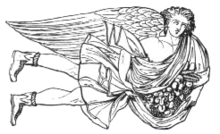Astraeus
In Greek mythology, Astraeus or Astraios (/əˈstriːəs/; Ancient Greek: Ἀστραῖος means "starry"[1]) was an astrological deity. Some also associate him with the winds, as he is the father of the four Anemoi (wind deities), by his wife, Eos.
| Astraeus | |
|---|---|
God of the Dusk | |
 | |
| Abode | Sky |
| Personal information | |
| Parents | Eurybia and Crius |
| Siblings | Perses, Pallas |
| Consort | Eos |
| Offspring | Boreas, Notus, Eurus, Zephyrus, Phainon, Phaethon, Pyroeis, Hesperos, Stilbon, Astraea |
Mythology
According to Hesiod's Theogony and Bibliotheca, Astraeus is a second-generation Titan, descended from Crius and Eurybia.[2] However, Hyginus wrote that he was descended directly from Tartarus and Gaia and referred to him as one of the Gigantes.
Appropriately, as god of the dusk, Astraeus married Eos, goddess of the dawn. Together as nightfall and daybreak they produced many children who are associated with what occurs in the sky during twilight.
They had many sons, the four Anemoi ("Winds"): Boreas, Notus, Eurus, and Zephyrus,[3] and the five Astra Planeta ("Wandering Stars", i.e. planets): Phainon (Saturn), Phaethon (Jupiter), Pyroeis (Mars), Eosphoros/Hesperos (Venus)[4], and Stilbon (Mercury).[5] A few sources mention one daughter, Astraea, the goddess of innocence and, sometimes, justice.[6]
He is also sometimes associated with Aeolus, the Keeper of the Winds, since winds often swell up around dusk.
Family tree
Notes
- Robin Hard. The Routledge Handbook of Greek Mythology (2004)
- Hesiod. The Theogony of Hesiod. Forgotten Books. p. 13. ISBN 978-1-60506-325-6.
- Smith, William (1859). Dictionary of Greek and Roman Biography and Mythology. Little, Brown and Company. p. 389.
Astraeus.
- Cicero wrote: Stella Veneris, quae Φωσφόρος Graece, Latine dicitur Lucifer, cum antegreditur solem, cum subsequitur autem Hesperos; The star of Venus, called Φωσφόρος in Greek and Lucifer in Latin when it precedes, Hesperos when it follows the sun – De Natura Deorum 2, 20, 53.
Pliny the Elder: Sidus appellatum Veneris … ante matutinum exoriens Luciferi nomen accipit … contra ab occasu refulgens nuncupatur Vesper (The star called Venus … when it rises in the morning is given the name Lucifer … but when it shines at sunset it is called Vesper) Natural History 2, 36 - Barney, Stephen et al., transl., ed. (2010). The Etymologies of Isidore of Seville. Cambridge U. Press. p. 105.CS1 maint: extra text: authors list (link)
- Anthon, Charles (1855). A Classical Dictionary. Harper & Brothers. p. 219.